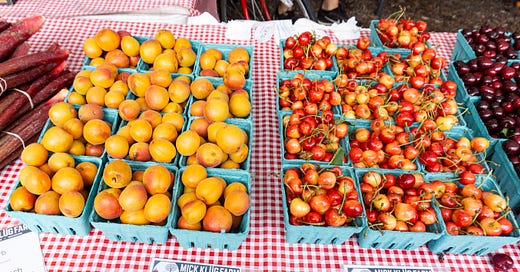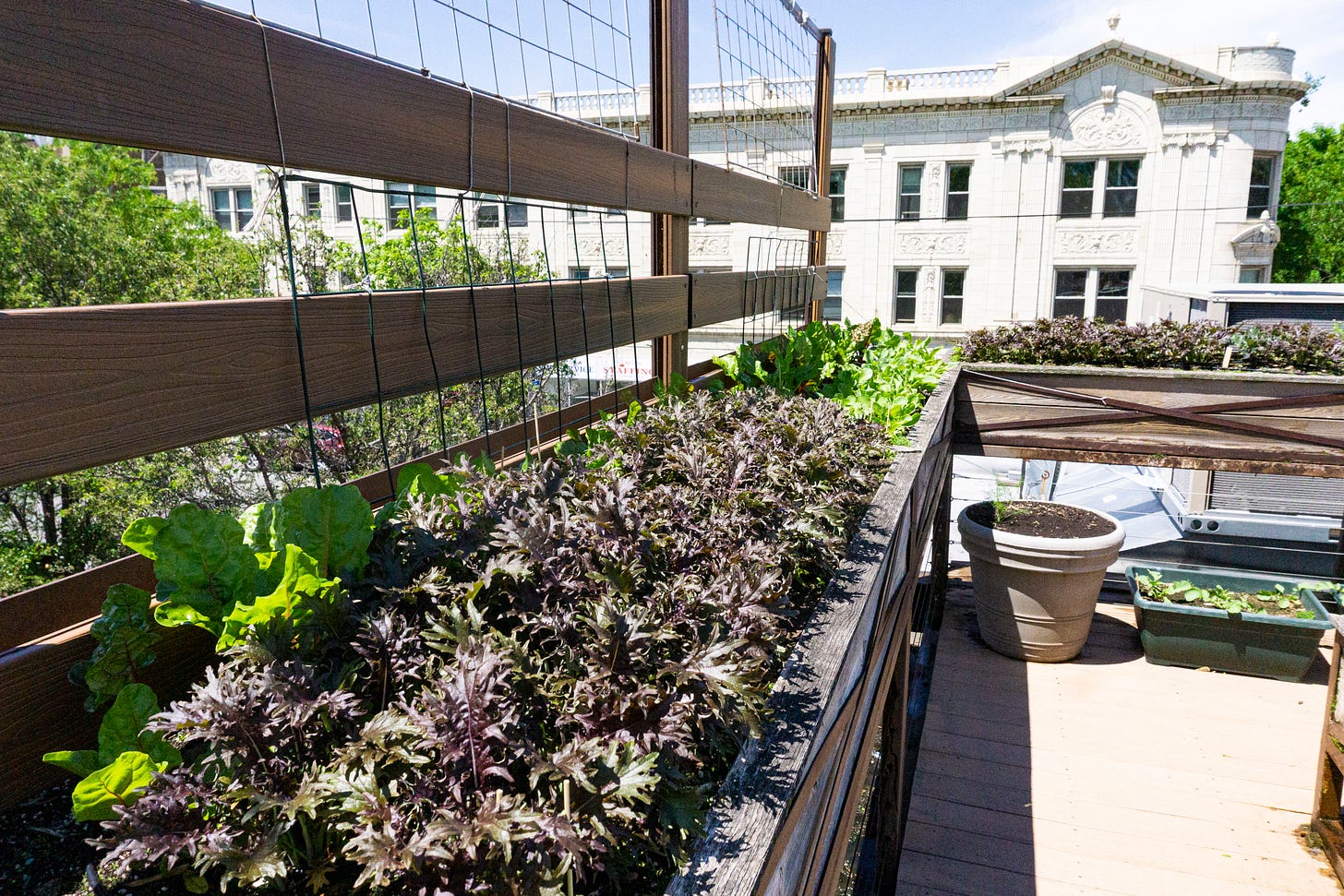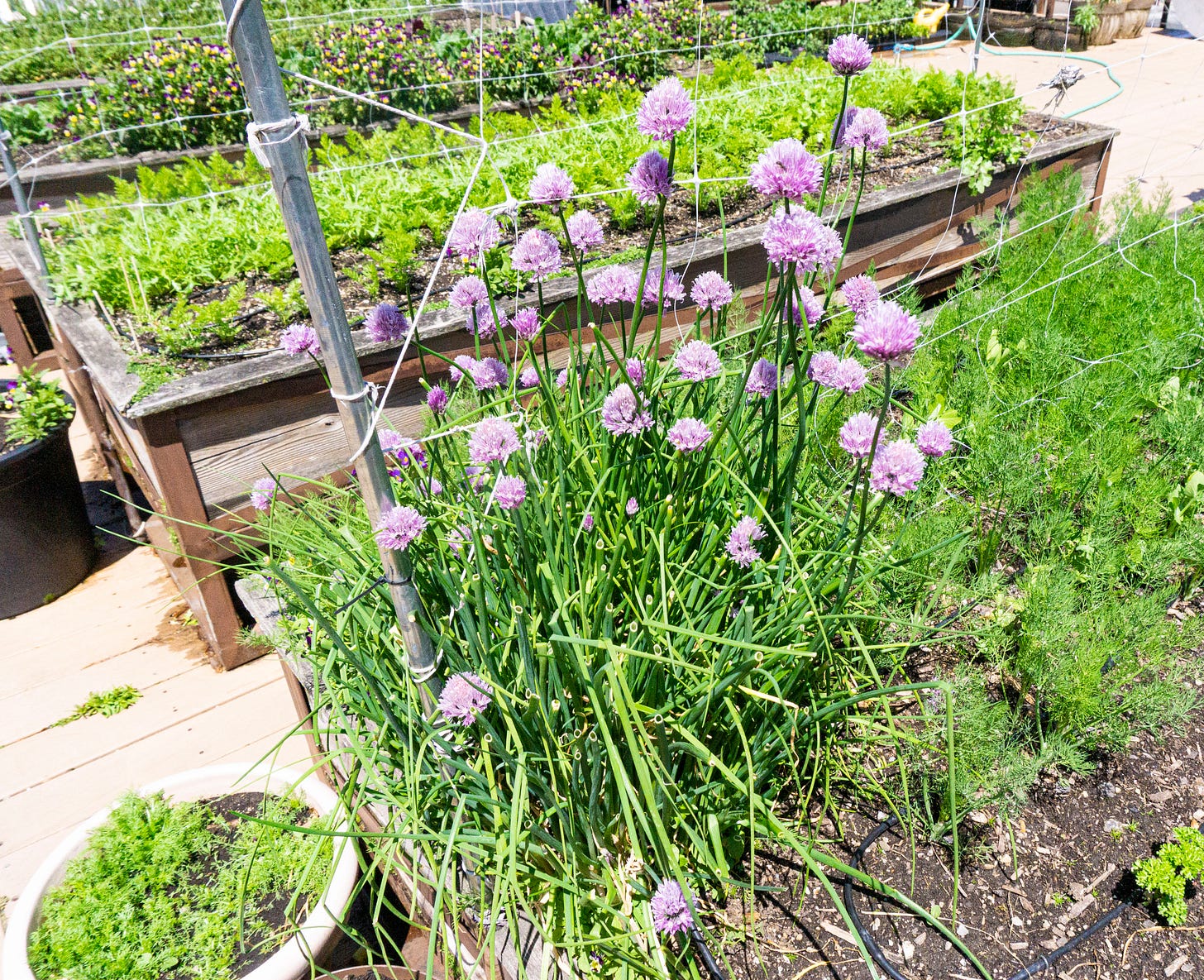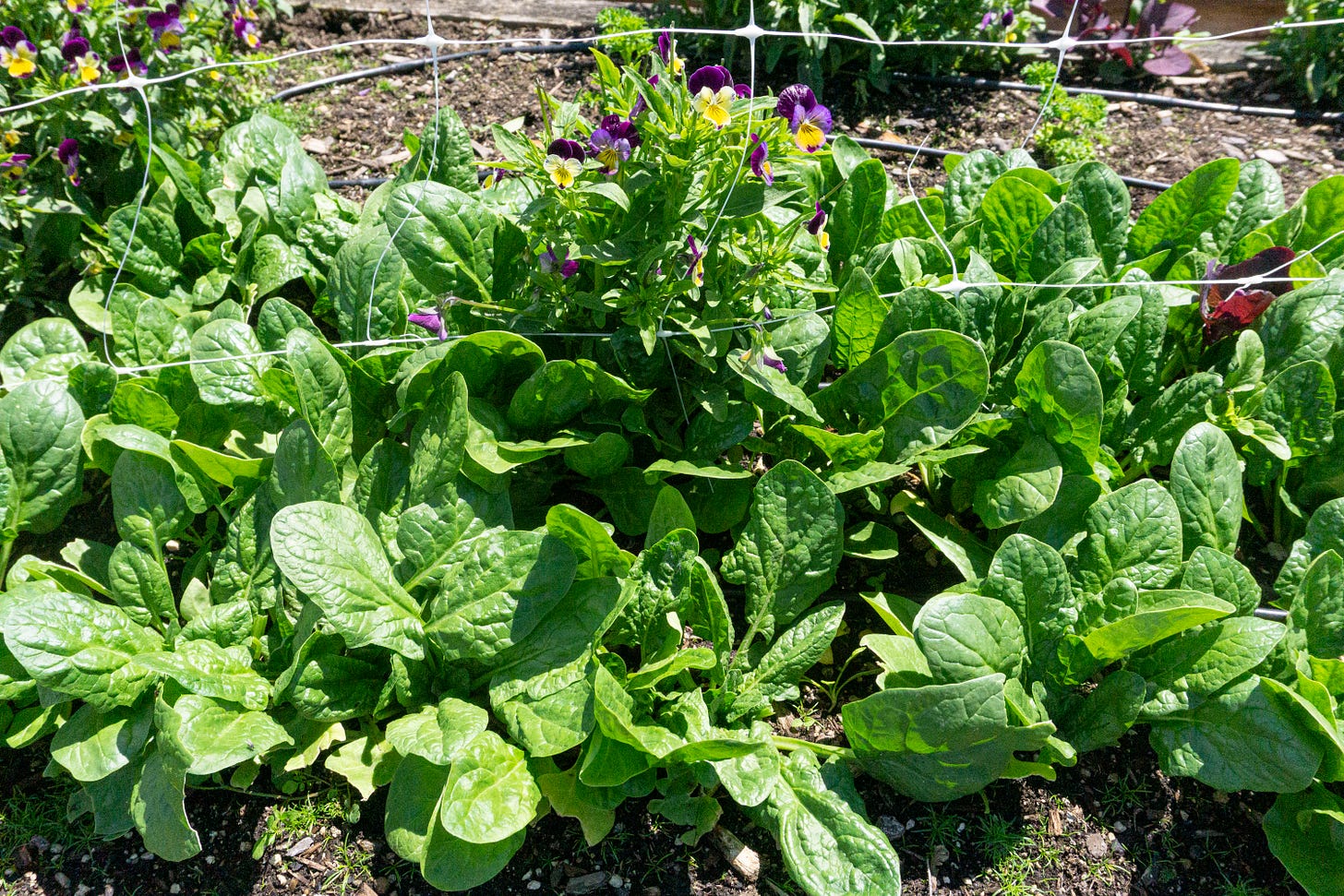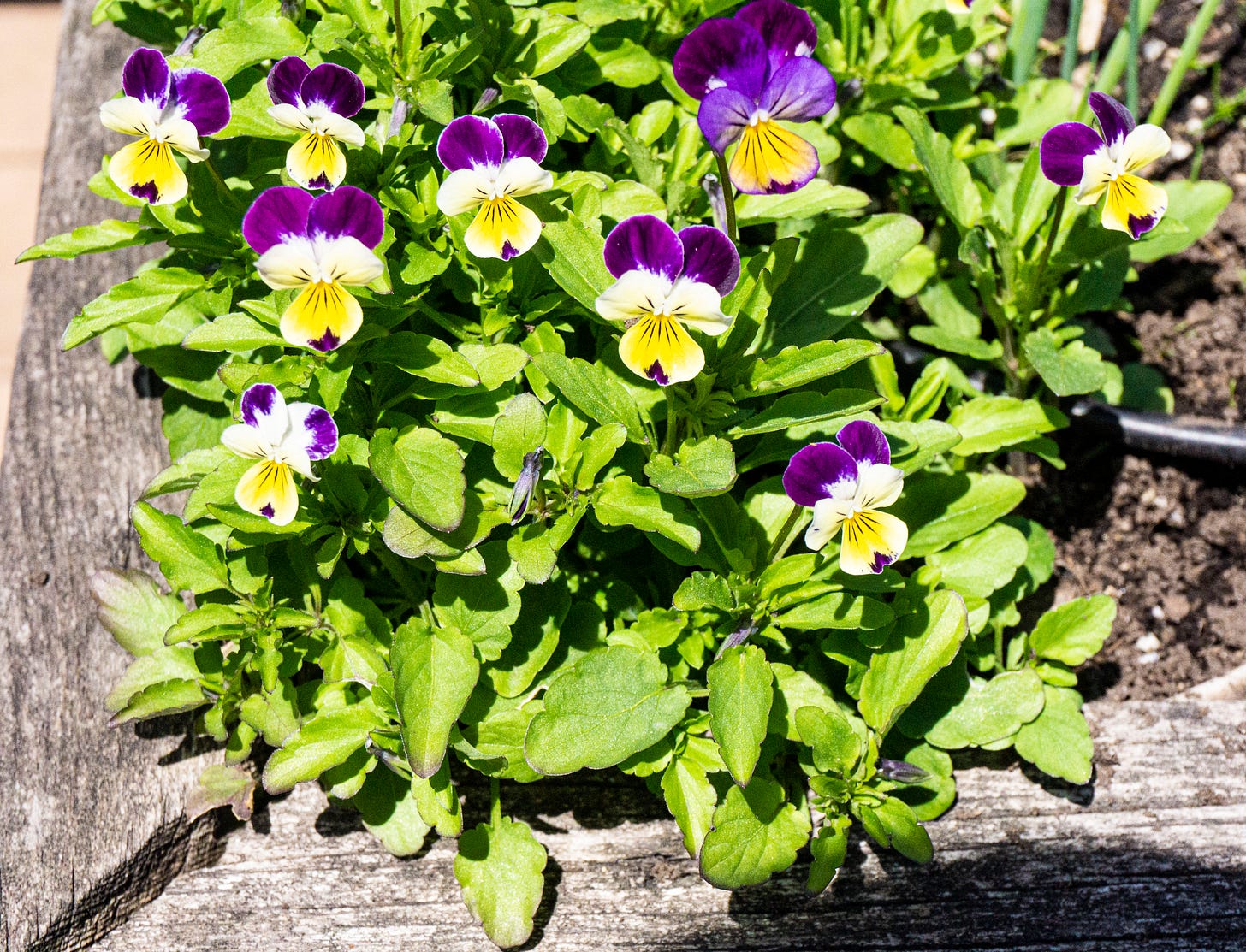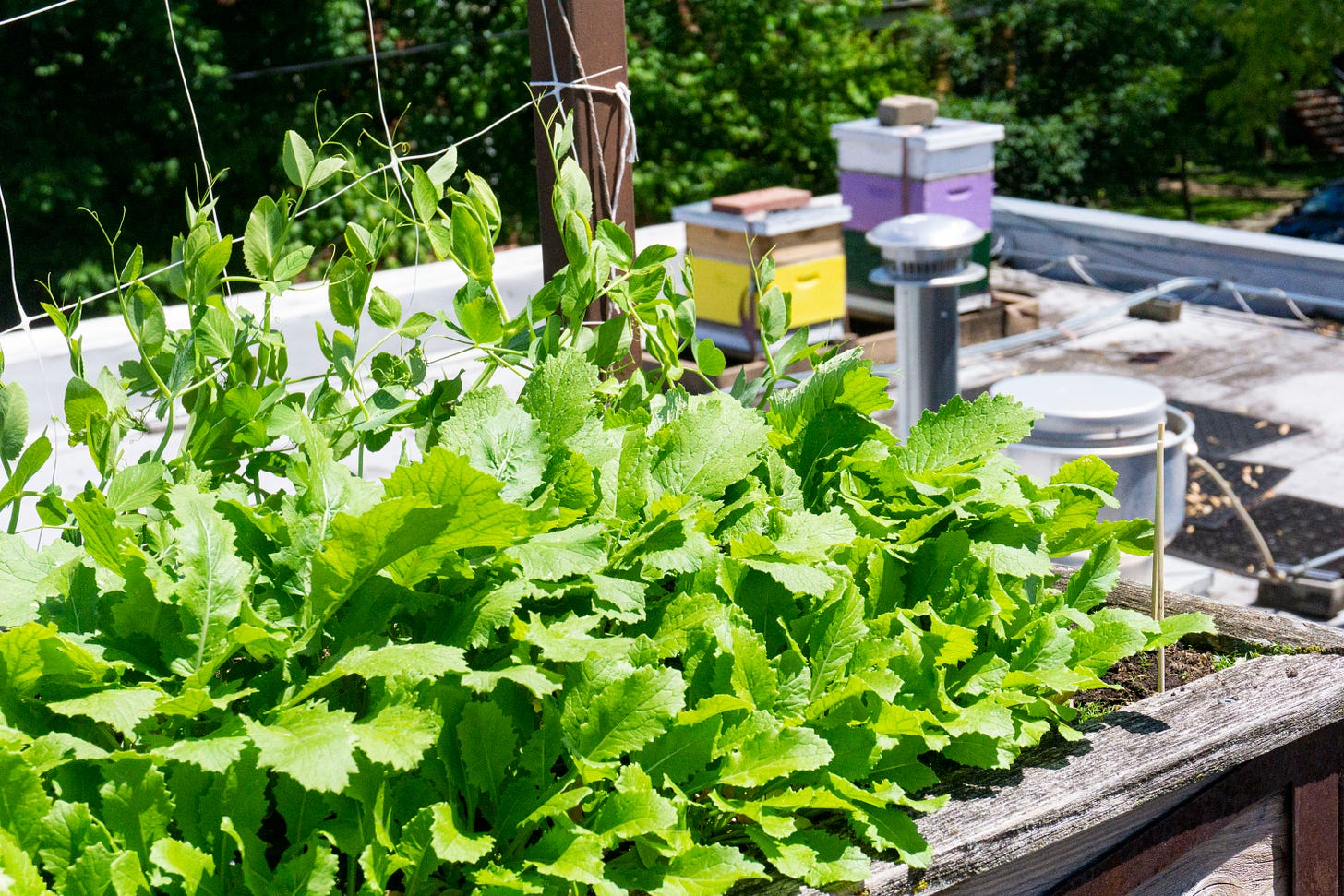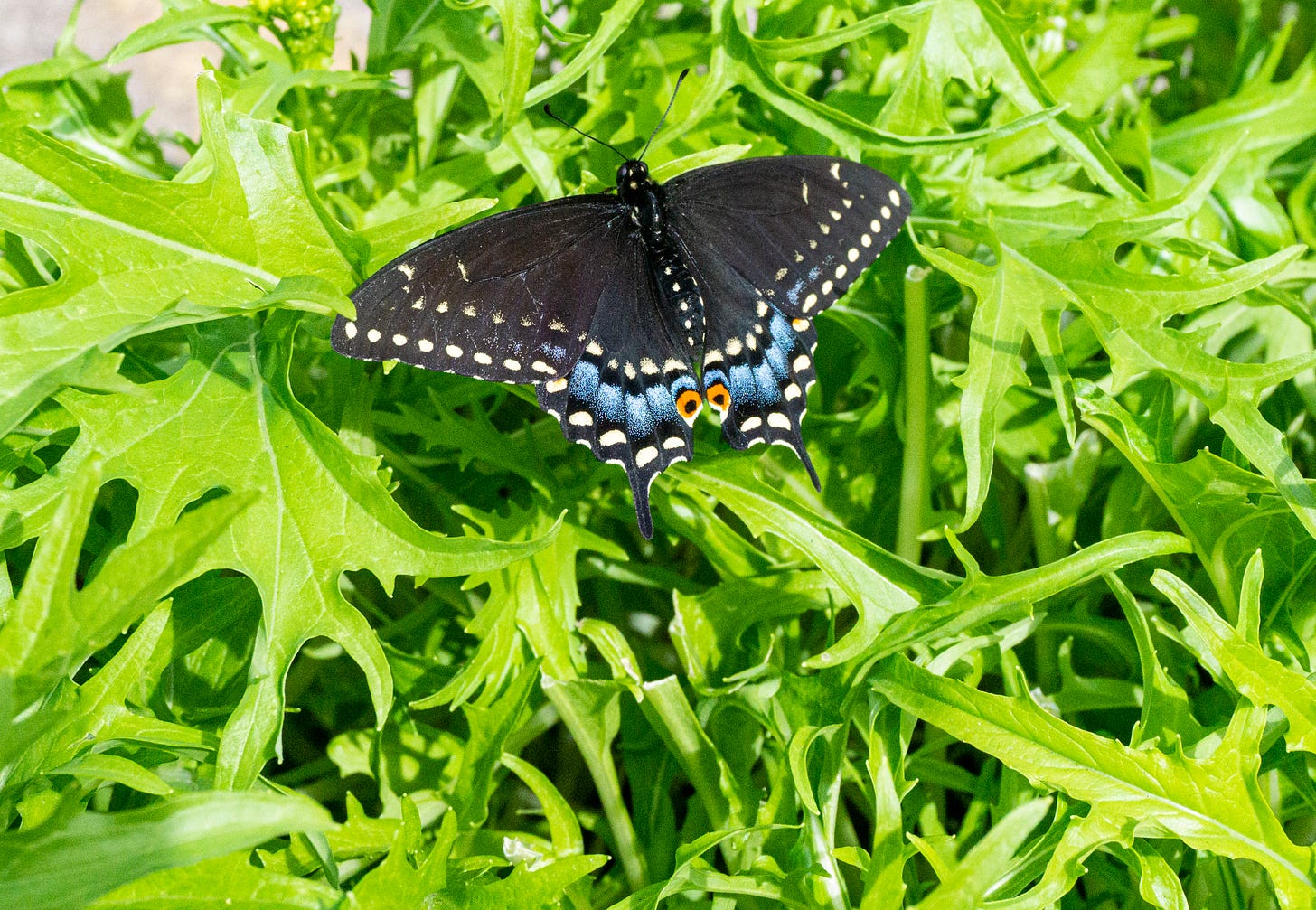In Season News

Today’s Chicago Region Farmers Markets
Accuweather.com forecast: A.M brief shower possible, then clouds and sun, high 78
Weather.com forecast: Cloudy, slight chance of a shower, high 77
In Chicago
Andersonville Farmers Market, 1500 W. Catalpa Ave., Chicago, 3 p.m. to 7 p.m.
Garfield Ridge Farmers Market, 6072 S. Archer Ave., Chicago, 3 p.m. to 7 p.m.
Green City Wednesday Market, 1817 N. Clark St., Chicago, 7 a.m. to 1 p.m.
Ravenswood Farmers Market, 4900 N. Damen Ave., Chicago, 4 p.m. to 7 p.m.
Uptown Farmers Market, W. Wilson Ave. & Broadway, Chicago, 2:30 p.m. to 7:00 p.m.
In Suburbs and Exurbs
Elmhurst Farmers Market, 541 S. York St., Elmhurst, 7 a.m. to 1 p.m.
Northbrook Farmers Market, 1975 Cherry Lane, Northbrook, 7 a.m. to 1 p.m.
Palos Heights Farmers Market, 12217 S. Harlem Ave., Palos Heights, 8 a.m. to 1 p.m.
Ravinia Farmers Market, Jen Jensen Park, Highland Park, 7 a.m. to 1 p.m.
Riverside Farmers Market, 10 Pine Ave., Riverside, 2:30 p.m. to 7:00 p.m.
Uncommon Ground’s Rooftop Hero
A Seasons of Change Farmer Story
Uncommon Ground was in the vanguard of Chicago farm-to-table restaurants when it opened its Lakeview location near Wrigley Field 30 years ago. Its newer location uptown in Edgewater is home to the first certified organic rooftop farm in America, and is the subject of Uncommon Ground’s contributions to our Seasons of Change farmer series.
When Helen Cameron (co-owner with husband Michael Cameron) wrote the first piece published April 13, she described the challenges the restaurants faced during the pandemic. And she cited the above-and-beyond efforts of rooftop farmer Allison Glovak Webb, who helped plant and manage the farm even during the time that the restaurants had to shut down and lay off all employees.
“One of the biggest blessings for me in 2020 was our rooftop farm at Edgewater and caring for the sidewalk farm at our Lakeview location. Despite our inability to pay Allison Webb, our Farm Director, while we were shut down, she came in to start our seeds indoors, and with a few volunteers we managed to clean up and reset for the 2020 season. We used seeds and fertilizers we had in stock and didn’t add our usual compost to the beds as we couldn’t afford it.”
To follow up, we recently visited with Allison to learn more about her route to rooftop farming. Allison has two daughters, ages 5 and almost 2, and they spend a lot of time at work with mom.
We look forward to many more subsequent visits as the tiny farm approaches its summer peak:
Q: Did you always garden when you were growing up?
A: I have always gardened, actually. I had my own little plot in my parents’ backyard. My dad gardened a lot, and that's in Detroit, so not like anything fancy. They gave me like my own little probably like three square feet to grow whatever I wanted and I have been probably been gardening since I was like five or six years old.
Q: So were you growing flowers?
A: As a kid? It was vegetables, actually. Tomatoes and chives were my favorites.
Q: I always look at everybody's LinkedIn profile, and you went to college for photography. Then you made a transition pretty quickly.
A: I went to Columbia College in Chicago. As I was finishing up, I took a horticulture class as an elective and all of my photography projects started to be about plants… After I graduated, I started working at Brew and Grow, a little hydroponic store… Farmer Jen [Rosenthal], the former farm director here, used to come in all the time, and I was also a bartending next to Lula Cafe [in Logan Square], where she also doing the gardens. So she and I just got to talking and when she needed an assistant, I applied, and that was seven years ago....
Q: Was it just an easy segue to taking over as farmer when Jen decided to move on?
A: It was, I was really excited to… One of my favorite times is in the winter, when I can visualize what plants and planting where, and how everything's going to grow into its space and everything. I really live in my head a lot.
Q: So you had early life experience growing a garden in the ground, then you worked with hydroponic systems. How different was it to grow at a facility like this? It’s all raised beds, but it's all dirt.
A: At home, I always grew in the dirt, right? And so, even when I was working at the hydroponics store, I had a garden in my backyard and I had the Earth Boxes going. I really prefer growing in the dirt. You get your hands dirty. There's a lot more interconnected facets to it, the insects and the soil and the bacteria, it's just a lot more interesting for me.
Q: So how have how's the farm changed in those years since if you took over? I mean there's so much here that looks recognizable but obviously you're putting your own imprint on it.
A: We still do a lot of really straight lines, but I do a lot more interplanting with stuff. So I let these Johnny Jump-Ups kind of grow all over the place. I've got volunteer dill and chamomile here and there. It kind of gets it a little bit more of an organic feel, I think. I do a lot more interplanting of flowers, so instead of like a bed of flowers, I put a little bit here, a little bit there, and little bit here and a little there.
Q: Do you ever do anything that would be the equivalent of cover cropping?
A: We do. We do hairy vetch in the fall. We try especially to make sure we get it into the beds where the tomatoes were because they're such heavy feeders… It does a couple things for us. Cover crops pull nitrogen from the air to help your soil stay healthy. We get so much wind erosion, and they do a nice job holding our soil in place so we don't have as much loss come spring. Then of course we chop them up and we turn them into the soil. So there’s like a mulch in there too.
Q: Every rooftop grower I’ve talked to says that wind is the biggest challenge. What are some of the other ones that are particular to this kind of environment?
A: The birds. The birds are relentless, especially in spring. The birds love the peas especially when they're nesting and they're laying eggs… The peas, the radishes, the turnips and everything… They're done now, but they'll be back in the fall though.
Q: Which of the plants are pollinator friendly, or are they all? [The Uncommon Ground rooftop farm maintains its own beehives.]
A: They love the chamomile. We do a lot of sunflowers. They love our chive blossoms. I tend to let a lot of things flower. You can see our arugula, it’s bolting and it’s going to flower. And instead of pulling all that, I'm going to let them bloom for a little while so that the bees can get at them for a bit.
Q: In terms of the annual planning process, obviously a lot of it is driven by the needs of the restaurants. But do have like a number of new plants or new varieties that you aim for every year? Or is it just kind of like you look through the seed catalog and say, Let's try that.
A: We always have some standard things that we know work well in our growing environment that the kitchen utilizes. It can be a challenge sometimes, that kind of dance between the kitchen and the farm. In spring you're like, here's 30 pounds of turnips, and they’re like, okay, we'll put them in everything.
Then the seed catalogs… We stick to a lot of the same crops and we'll switch up varietals. But then like this year I was looking at a seed catalog and I was like, loofah, never grown loofah, I've always wanted to grow loofah. Helen said, Me, too, so we’re growing loofah this year. Apparently while they're young, you can actually eat them. So, we're gonna count them as a food crop, right?
Q: So let’s talk about last year’s pivot. You really have your plan laid out for 2020, you're getting close to starting to turn the garden over and then the pandemic hits. I know that for a while Helen and Mike had to lay everybody off. But you were the hero of her first story because she said you still came and you still helped get the farm together.
A: I did. They were they were shut down and they weren't unfortunately paying anybody. But it’s kind of my space to come to with my girls. So I came here, I started all this summer crop. I'm so invested, this is like part of me. Also we're outdoors, no one else is coming here, and it's doing something I love. I'm really glad it all worked out… We were saying if the restaurant didn't reopen for a while, maybe we were gonna grow and donate to the staff…
Q: We're already making progress towards whatever The New Normal is. So you did you have a pretty regular, a normal kind of planning? Did you feel you had the confidence to?
A: Yeah, for the most part, for sure. The only thing is gardening really took off with the pandemic, which is a fantastic thing, but trying to get resources was like, help, help, help. The seed companies were shutting down again. Lake Street Supply, which is our compost supplier, is gone. So there were just a lot of little headaches like that, that we're kind of residual of the pandemic. But in terms of like the garden planning and planting and all that went very, very much as it should.
Q: And I remember Helen said that you weren't able to compost last year. She told me about the volunteer army you got this year to schlep compost bags up the steps.
A: Oh my gosh, I've never had so many people show up before. It took us like two hours to carry four cubic yards of compost up here. That's a lot of compost. It’s a truckload. Our guests too, they really did a good job. You know, when we were just takeout only, we did pretty well.
[Note: Uncommon Ground will mark its 30th anniversary next month. This will includes Haiku Milieu, a concert with several performing artists that will take place at the Lakeview location, 3800 N. Clark St., on July 15 from 7:30-10 p.m. Click the button below for more information and tickets.]
And the Scone Winner is…
Thanks to Caitlin, who submitted the correct answers to the Boomer pop culture quiz (based on Local Food Forum plays on words). Your market tour and scone await.
The questions and answers:
1) “RU Ex-spear-ienced” refers to what album by which 1960s rock god and his band?
Cailtin: The answer to the first clue happens to be one of my favorite groups — The Jimi Hendrix Experience. "Are You Experienced?" was the title of their debut album.
2) “Give Peas a Chance” refers to what song by which celebrated rock couple?
Caitlin: The song was originally credited to John Lennon and Paul McCartney, but popularly associated with Lennon and Yoko Ono.

